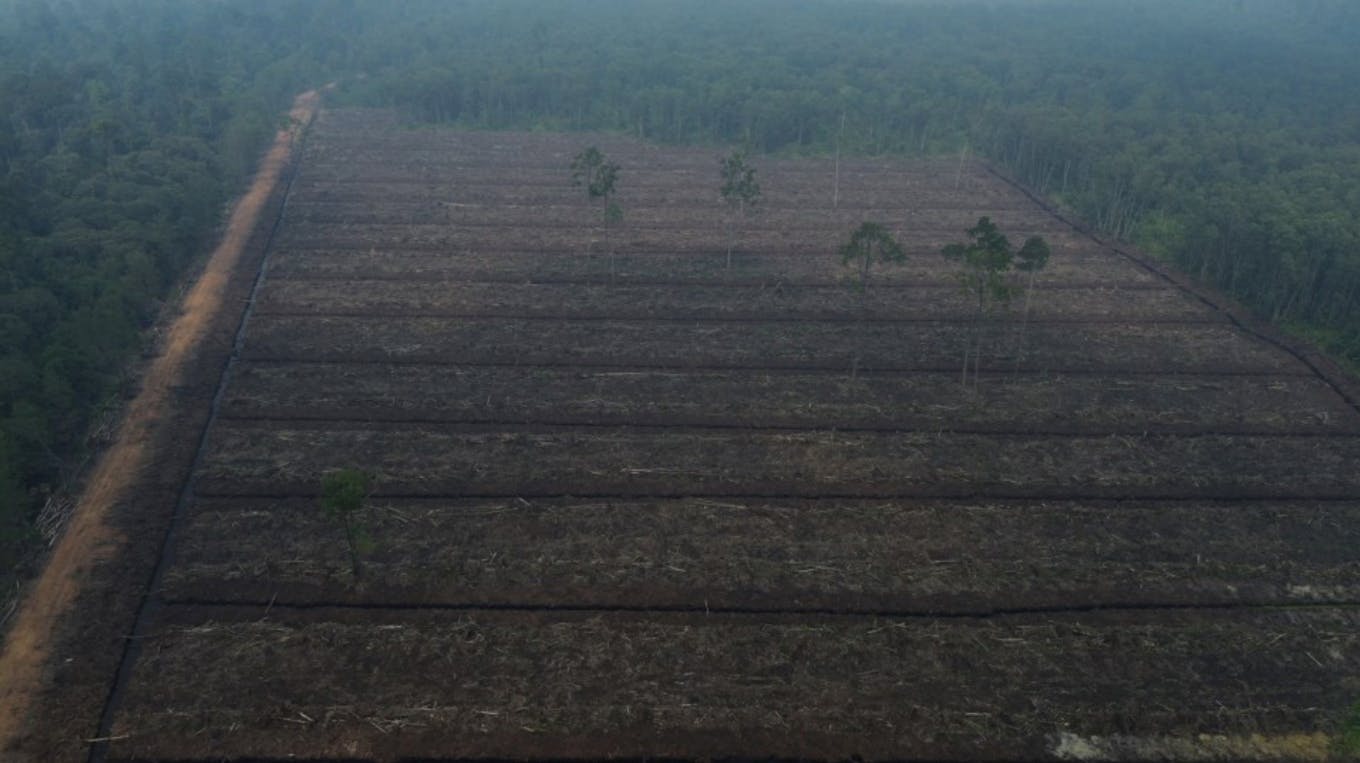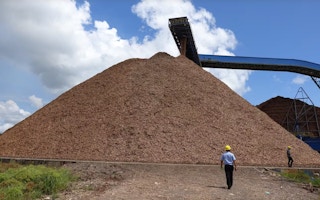A decade after Asia Pulp and Paper (APP) made a landmark commitment to stop clearing natural forests, Greenpeace – the environmental campaign group that helped forge the Indonesian company’s historic pledge in 2013 – has released a damning report on APP’s track record at keeping its promises.
Greenpeace’s Forest promises pulped report, published on Tuesday, said that despite some early progress made by the Sinar Mas-owned paper giant in implementing its forest conservation policy (FCP) policy, such as committing to conserve 500,000 hectares of forest and rehabilitate damaged peatlands, its commitment has “unravelled” since 2017.
The non-profit’s report indicates that despite its commitment to stop deforestation in its concessions and among its suppliers, APP has been linked to 46,000 to 75,000 hectares of forest loss over the past 10 years. The report added that multiple breaches of the promises the company made in its FCP were found after investigations and analysis.
APP has refuted Greenpeace’s allegations and said there has been no deforestation in its supply chain since 2013. “Why would APP engage in deforestation when it is one of the most scrutinised forestry businesses in Indonesia? the firm said in a statement. “What benefit would APP gain by setting fires within its own pulpwood concessions?”
Back in 2013, Greenpeace had partnered with APP to draw up its FCP, which saw the company pledging to stop chopping forests and draining peatlands to develop plantations. Before that, analysis by a non-profit found that APP had cleared an estimated 2 million hectares of climate-critical rainforest since the mid-1980s. The policy, released after years of pressure from activists campaign groups, was hailed as a game-changer for the tropical pulp and paper sector.
Greenpeace, which since made the decision to end its cooperation with APP in 2018, called for APP to provide verifiable evidence that it is meeting the promises made in its FCP and related commitments in the report. This includes immediately enforcing no deforestation with suppliers and restoring any areas cleared since the enactment of the policy and reversing changes that goes against the commitments.
Some of the most climate-critical incidences highlighted in the report have occurred in South Sumatra, a red-zone for peatland burning and transboundary haze air pollution, where APP opened a massive new pulp mill in 2016. An investigation by Greenpeace in 2020 found that approximately 3,500 hectares of peatlands had been cleared in APP’s concessions or those of its suppliers over the previous two years, drainage canals dug into the peatland and peatlands burnt.

Peatland development in preparation for plantations in APP’s PT Tri Pupajaya concession in South Sumatra, October 2023, featured in Greenpeace’s Forest Promises Pulped report. Image: Greenpeace
APP said that it has not converted any peatland since 2013 and the allegation is “mostly the result of conflicting maps, definitions, and timelines.”
The company has also been heavily implicated in transboundary haze air pollution, as APP operates on peatlands which are vulnerable to burning after they are drained to develop plantations. Some 174,000 hectares of peatland areas burnt inside APP concessions in 2015 – one of the worst ever years for peatland fires and smog in Southeast Asia.
So far this year, 12,749 hectares of peatlands have burned in APP’s concessions, according to Greenpeace. APP has not responded to Greenpeace’s recent allegations regarding fires, although the company has said previously that many of the fires were started outside of its concessions.
APP committed to retire and rehabilitate 7,000 ha of peatland plantation as part of its No Deforestation, No Peat and No Exploitation (NDPE) commitment in 2013. Greenpeace has questioned the company’s progress on that front. APP has claimed it has retired 26,883 ha of plantations on peatland, but Greenpeace points out that the company has lacked transparency on where these areas are, and the area retired is a “tiny portion” of the 1.2 million hectares of peatland in the firm’s concessions.
APP said that, in addition to the retired peatland, it has started restoration work on 81,245 ha, and earmarked an additional 7,300 ha for retirement in the future. The company noted that “forests do not just materialise once restoration work starts” and full restoration can take at least 60 years.
The company has also pledged to resolve the conflicts it is involved in with local communities. APP claims that 63.3 per cent of social conflicts have been resolved, but Greenpeace notes that the firm does not disclose the total number of conflicts, nor does it publically track them, report what the issues are, and their resolution.
In response to this, APP said it does not make conflict cases public because of their complex nature and because they often involve “self-interested parties”, such as illegal logging, who “profit from muddying waters and prolonging conflicts.” The company added that its conflict resolution rate is “well ahead of the curve”.
More recently, APP changed its FCP deforestation cut-off date – the change is highlighted in the company’s 2022 sustainability report – allowing it to source from suppliers that have deforested up until December 2020, far after the original cut-off of February 2013, Greenpeace said. The move followed a relaxation in policy for accepting known deforesters in supply chains from the Forest Stewardships Council (FSC), the forestry industry’s lead eco certifier. APP has been trying to regain the FSC certification it lost in 2007 after evidence was found of destructive forestry practices.
Greenpeace called the change in cut-off date a “huge watering-down” of the company’s no-deforestation commitment. APP said the change in cut-off date does allow the company to accept new suppliers that have deforested post-2013 and before 2020, but the change “is not a weakening” of the commitment.
The road ahead
Beyond providing verifiable evidence that it is meeting its promises, Greenpeace said APP also needs to show clear progress on conflict resolution and peatland rehabilitation. This can be done by providing downloadable digital maps in geo-data format showing where its conservation areas and peatland areas are located, and where the remaining areas of high conservation value forest are within its concessions.

















